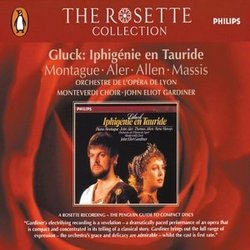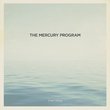| All Artists: Thomas Allen, Christoph Willibald Gluck, John Eliot Gardiner, Diana Montague, Sophie Boulin, Lyon National Opera Orchestra, Colette Alliot-Lugaz, Danielle Borst, Nancy Argenta, John Aler, Carol Hall, Jane Armstrong, Jean Knibbs, Lucinda Houghton, Mary Seers, Nicola Jenkin, Rachel Platt, Suzanne Flowers Title: Gluck: Iphigénie en Tauride Members Wishing: 0 Total Copies: 0 Label: Philips Release Date: 9/14/2004 Genre: Classical Styles: Opera & Classical Vocal, Historical Periods, Classical (c.1770-1830) Number of Discs: 2 SwapaCD Credits: 2 UPCs: 028947617129, 028947617129 |
Search - Thomas Allen, Christoph Willibald Gluck, John Eliot Gardiner :: Gluck: Iphigénie en Tauride
 | Thomas Allen, Christoph Willibald Gluck, John Eliot Gardiner Gluck: Iphigénie en Tauride Genre: Classical |
Larger Image |
CD DetailsSimilar CDs
|
CD ReviewsA voice teacher and early music fan George Peabody | Planet Earth | 07/08/2007 (5 out of 5 stars) "IN REFORMING THE FRENCH 'TRAGEDIE LYRIQUE' CHRISTOPH W.GLUCK REACHES HIS PEAK!!!! After Christoph Willibald Gluck (1714-1787) had thoroughly revitalized Italian 'opera seria', he devoted his energies to the reform of the French 'tragidie lyrique' illustrated in his operas 'Orphee et Eurydice' and 'Iphigenie aur Tauride', both staged in Paris in 1774 With 'Iphigenie en Tauride' Gluck took the final step in his operatic reform. There are no longer any recitatives; there are dramatic scenes interspersed with arioso-like structures. The arias hardly have self-contained or conclusive forms; rather they are scenes portraying an emotion. All of this makes for a truly enjoyable group of lovely and highly emotional melodies that seem to go on and on and on. The story, taken from classical legend and closely linked to the events of 'Iphegnie en Aulide', takes place after the conquest of Troy by the Greeks. The opposition between civilised and uncivilised, between high-minded or tortured morality and barbarism exist throughout the opera. This opera really presents a drama of human passions. John Eliot Gardiner has assembled an outstanding group of singers, who very capably perform their roles to perfection. Diana Montague (mezzo-soprano) as Iphigenie sings with a rich and full tone quality, but also presents a 'lightness' that mezzos do not always 'pull off'. She sings one of the most exquisite arias near the end of Act II "O malheureuse Iphigenie" (O Wretched Iphigenie) in which she bemoans the loss of her family. John Aler (tenor) as Pylade is simply marvelous in this opera with a true operatic sound; it is not surprising that John Nelson chose him 5 years later (1990) to play Jupiter in his award-winning production of Handel's 'Semele'. Thomas Allen (baritone)plays a very exciting and masculine Orestes and he and John sing two marvelous duets in the opera. These duets both occur near the end of Act III, my favorite being the very exciting and superbly sung "Et tu pretends encore que tu m'aimes" in which they are arguing rather violently as to who will carry out a dangerous mission. Rene Massis (bass-baritone) as Thoas sings his very very exciting and somewhat violent opening aria with great power and gusto. I loved it all. And the orchestra and Monteverdi Choir added their expertise. Gardiner,to my mind, always manages to please. This recording was made in 1985 which was somewhat early in Gardiner's career. The liner notes are quite informative and the libretto is in English as well as French." The Last Word in Neoclassical Dignity John D. Pilkey | Santa Clarita, CA USA | 09/30/2006 (5 out of 5 stars) "The plot of this opera is the last word in neoclassical dignity and the triumph of good over evil. The music could not be more perfectly adapted to the theme. Iphigenia's opening prayer for justice follows a pleasant, major key overture like the music representing Elysium in Orphee et Eurydice; but Tauris (Crimea) is no Elysium. A flowing melody is followed by quick music also in major key but darkening to represent a storm at sea as Iphigenia looks on from the shore and begins her prayer. The opera is never as dark as Cherubini's Medee but has plenty of dark moments as the heroine struggles to save her brother Orestes from human sacrifice even before she realizes who he is. The Scythian tyrant Thoas is bent on sacrificing foreigners to save his own barbaric life. The dominant themes are both Greek civilization versus Scythian barbarism and the sacrificial power of friendship characteristic of a central trend in western culture after 1740. The opera is filled with lofty elements such as Iphigenia's dream vision of her mother Clytemnestra's ghost handing her a dagger to avenge her death at the hands of Orestes; Thoas' desperate appeal to Iphigenia as a priestess of Diana to appease the gods with her tears; Orestes and Pylades' argument over which of the two will achieve the honor of martyrdom for the other; the Furies' attempt to torment Orestes for his blood guilt; the heroine's unwillingness to perform human sacrifice; the "noble simplicity" of the priestess' prayer to Diana; and the climactic struggle against Thoas involving Diana's appearance to declare that "my statues" belong to the humane Greeks rather than the Scythian savages." Iphigenie en Tauride Robin Friedman | Washington, D.C. United States | 11/09/2008 (5 out of 5 stars) "The reformer of opera, Christoph Willibald Gluck (1714-1787) is best known for Orfeo, but Iphigenie en Tauride may well be his greatest work. Iphigenie in Tauride dates from 1778, making it Gluck's next to last opera. It was composed during Gluck's lengthy stay in Paris and met with immediate success. The opera is highly compact, consisting of four acts rather than five and running slightly over an hour and one-half. The libretto is in French and written by one Nicolas-Francois Guillard. The story is loosely indebted to Euripides. Goethe also wrote a version of this story.
The opera is unusual in that it involves friendship and brother-sister rather than erotic love. The opera also has as a theme the value of civilization and Englightenment over barbarism. The story is based upon the Greek myth of the house of Atreus. Iphigenia, the daughter of the Greek king Agamemnon, has become a Priestess in Tauride -- the people are called Scythians--after she has been rescued by the goddess Diana from an attempt to sacrifice her. The opera opens with a scene of a calm sea followed by a furious storm which deposits two strangers in Tauride. Following the local custom, the strangers are to be put to death by Iphigenia. The two strangers are Iphigenia's brother Orestes, who is under a curse for killing his mother, and his friend Pylade. Iphigenia tries to save one of the pair from death, and chooses Orestes, not recognizing him. Orestes insists on saving Pyade. Just before she is to put Orestes to death, she recognizes him. The king of Tauride, Thoas, insists that the sacrifice be carried out. But Pylade returns and kills Thoas. Diana then intervenes and saves the Greeks as the opera comes to a triumphal conclusion. In this opera, Gluck attained his goal of a near-total fusion between music and drama. The work is a combination of simplicity, directness, and passion. Recitive and arias are fused together almost seamlessly to create a musical unity. Dance movements, characteristic of French opera, are reduced. There are only two brief ballet interludes. Emotions and themes are characterized concisely. The orchestra and the chorus both play major roles in moving the action along. Iphigenie was neglected for many years, but performances have been increasing. There are several fine choices available on CD. This version of Iphigenie was originally recorded in 1985 and has been released as part of the Penguin "Rosette" collection on Phillips signifying a recording of extraordinary merit. It is also moderately-priced, an important consideration in these difficult times. John Eliot Gardiner conducts the Orchestre de L'Opera de Lyon and the Monteverdi Choir with an outstanding cast of soloists. Mezzo-soprano Diana Montague captures the many passions of the heroine. Baritone Thomas Allen is strong and heroic as Orestes. Tenor John Aler has a contrasting light voice as the faithful friend Pylade. Baritone-Bass Rene Massis snarls and blusters as barbaric King Thoas. The chorus and orchestra are superb and idiomatic, even though this is not a period instrument performance. With the unified nature of Gluck's score, there still are some wonderful individual moments in the opera. These include the opening orchestral introduction (not an overture) depicting the sea, which moved Hector Berlioz greatly when he first saw the opera. The music for the Sythian chorus in Act I is highly rhythmic and jagged. Iphigenie, Orestes, and Plyade have a moving trio, and there are two duets of friendship between Orestes and Plyade. Some of the striking beautiful moments for Iphigenie include her aria "O malhereuse Iphigenie" from Act II and her scenes with the chorus of priestesses in Act IV. Orestes, Plyade, and Thoas have grand music as well. The opera comes to a rousing conclusion with the final chorus. This CD comes with a complete libretto and translation together with informative program notes about the opera and about Gluck as a composer whose time may have come at last. For listeners who know only Orfeo, this recording is an excellent way to hear more of this great composer. Robin Friedman " |




